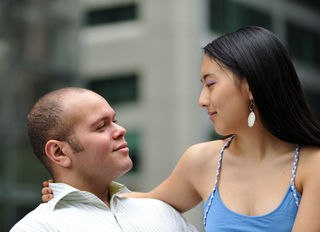Sharing doesn't diminish your happiness. It amplifies it.
And did you get what
You wanted from this life, even so?
I did.
And what did you want?
To call myself beloved,
To feel myself beloved on the earth.— Raymond Carver, “Late Fragment”

Source: Aspen Photo/Shutterstock
On characteristic that sets blue-ribbon relationships apart from the rest is the tendency for both partners to live in a state of appreciation for all the ways they enhance each other’s lives. They live with an attitude of gratitude that prompts them to continually seek ways to make each other’s lives easier, more pleasurable, more enriched, and more fun. They do this through various acts of assistance and support, spontaneously offering words of acknowledgment, kindness, and affection, as well as small gestures and physical touch that say, “I love you." In a variety of imaginative ways, they show up, remain present, notice the tiniest things, and are generous of spirit.
They know better than to take things for granted.
Even couples who have been together for 50 years or more still deserve to hear the words, “Thank you," when they do something that enhances their home or relationship. And contrary to pop culture, love does not mean never having to say you’re sorry. Partners in successful couples know, in fact, that when you love someone, you can’t help but say “I’m sorry” when you do or say something, intentionally or inadvertently, that causes them pain or distress. They notice and express appreciation for even the smallest actions because they never take their relationship for granted.
The word appreciation, of course, has two meanings—“thankful recognition” and “an increase in value." When things appreciate, they grow in value. Partners in loving relationships embody both meanings because they not only deploy expressions of thankful recognition, but, through those expressions, they increase the value of their relationship.
By taking advantage of the countless opportunities that present themselves on a daily basis to offer sincere gratitude through our words and behavior, we do more to enhance each other’s mutual well-being than giving each other anything that money can buy—literally.
Many of the people we’ve known and worked with who offer words and acts that embody a generosity of spirit weren’t always this way. They’ve learned from experience that what goes around, comes around. We refer to this understanding as enlightened self interest, or the recognition that when I do something that is intended to enhance the well-being of another, my own well-being is correspondingly enhanced. When two people in a relationship share this understanding, a positive cycle of reciprocal generosity is created, generating its own momentum and becoming self-perpetuating.
A lot of us grew up in families in which expressions of warm feelings towards others were inhibited or infrequent. Words of appreciation, acts of kindness, and other forms of support were rarely, if ever seen. Yet even if we hardly ever witnessed or received these affirmations as children, we can break the pattern of withholding and cultivate a spirit of generosity that promotes a greater willingness to share such feelings openly and spontaneously. Old habits can be broken and replaced by new ones, particularly when your intention and motivation to do so is strong.
Many of us experience feelings of gratitude and appreciation toward others more frequently than we express them. When we fail to share those feelings with the people toward whom we feel them, the feelings fade and become lost in the myriad of thoughts that constantly compete for attention in our mind. In experiencing these feelings, oursense of well-being and happiness is enriched, but an opportunity to enhance the quality of another’s well-being is lost when we fail to share our appreciation with them.
The gift of gratitude does not diminish our own happiness; it amplifies it. The more we give it away, the more we possess. Don’t take our word for it: Try it out and see for yourself. What have you got to lose?


No comments:
Post a Comment